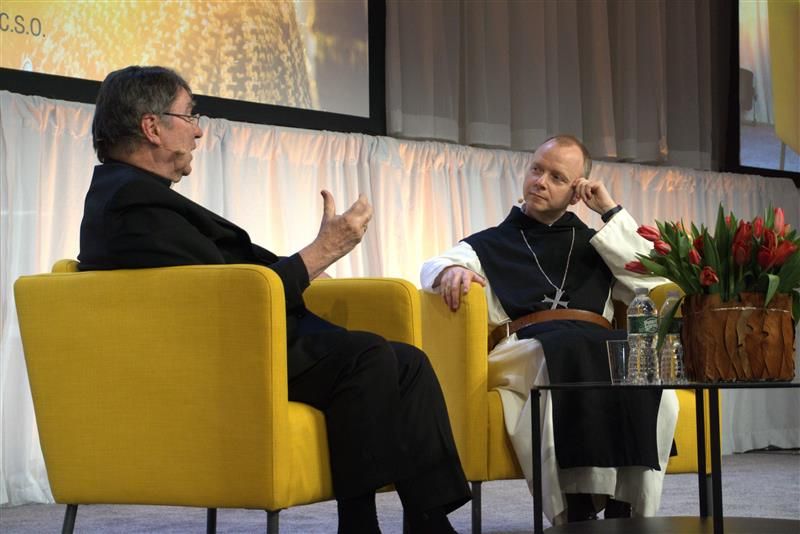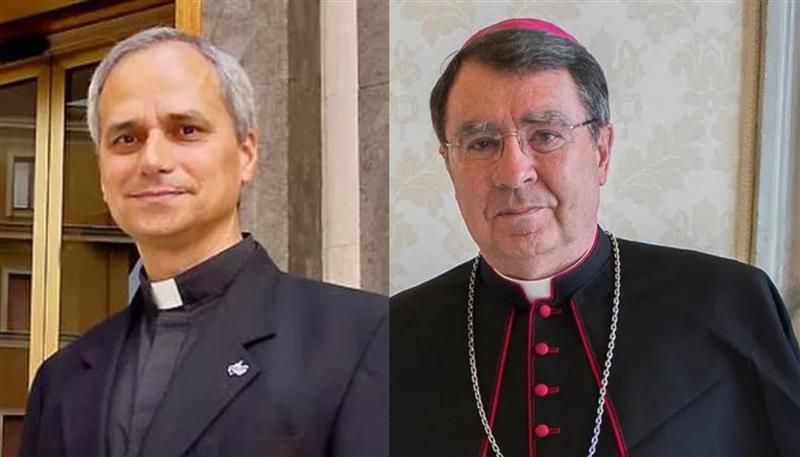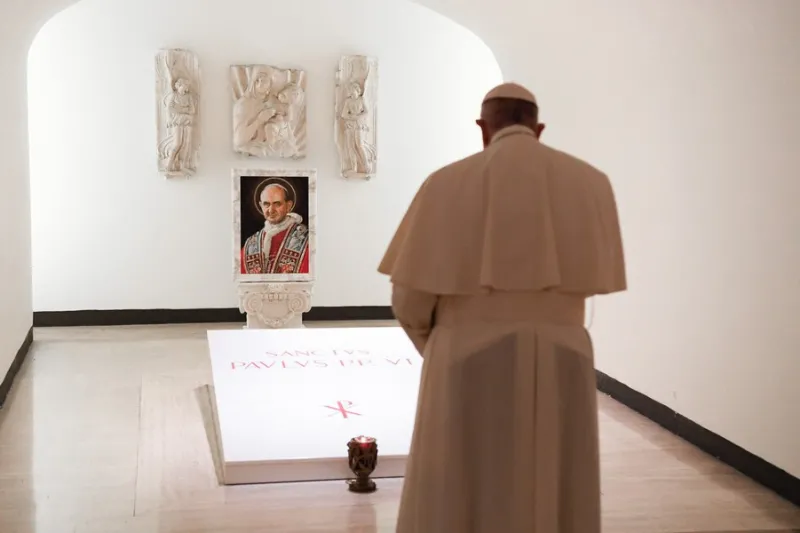 Monsignor Erik Varden (right), a Cistercian monk who is also the bishop of Trondheim, Norway, fielded questions about his book “The Shattering of Loneliness” from Archbishop Christophe Pierre, the apostolic nuncio to the United States, at this year’s New York Encounter on Feb. 17–19, 2023. / Credit: New York Encounter
Monsignor Erik Varden (right), a Cistercian monk who is also the bishop of Trondheim, Norway, fielded questions about his book “The Shattering of Loneliness” from Archbishop Christophe Pierre, the apostolic nuncio to the United States, at this year’s New York Encounter on Feb. 17–19, 2023. / Credit: New York Encounter
New York City, N.Y., Feb 22, 2023 / 12:47 pm (CNA).
“Come in yearners, come in yearners, this way, yearners!” said a young volunteer welcoming visitors to the New York Encounter, a three-day public cultural event held in the Chelsea neighborhood of New York City last weekend.
Her playful use of the word “yearner” was a reference to the title of a panel discussion that was about to begin, “Why Do I Have This Yearning?” featuring a conversation with two Catholic novelists, Chris Beha and Ron Hansen.
“Yearning” was a watchword for much of the New York Encounter, an annual weekend-long series of panels and exhibitions on topics of the day that is hosted by members of Communion and Liberation, the Catholic movement started by Father Luigi Giussani in Milan, Italy. His influential theological work, “The Religious Sense,” starts with the proposition that human beings have within them an innate longing — or yearning — for God.
A highlight of this year’s event was a conversation between a Catholic monk and a top papal diplomat that explored the desires of the human heart and its fulfillment in Christ.
Monsignor Erik Varden, a Cistercian monk who is also the bishop of Trondheim, Norway, fielded questions about his book “The Shattering of Loneliness” from Archbishop Christophe Pierre, the apostolic nuncio to the United States.
“When you read this book, you are accompanied by your monk who helps you precisely to discover your own reality, your own life,” said Pierre in recommending Varden’s book.
The discussion that followed traced the path of Varden’s spiritual journey, touching on the signposts that are there for everyone embarking on a search of his or her own.
Varden, 48, explained how he came to believe in God, beginning with his first realization of the existence of evil and suffering. After hearing his father relate having seen the lash marks on the back of an old man who had survived torture and imprisonment during World War II, he said, he began to see the world in a new light.
“Even as a child, I felt a strong desire to try and understand what this was about. Is there a way of making sense of something which is senseless — which suffering is, which pain is? And in that respect, I think it’s true to say that my journey of searching began at that point,” Varden said.
That journey eventually led him to the monastery, where, Varden said, the sudden absence of technology and general lack of stimuli forces one to see more clearly.
“You start realizing the importance of actually taking care about what you consume in terms of stimulus and imagery, because it stays there. You also begin to encounter your own poverty as a human being, and the mystery of suffering, of pain or violence, and the fact that it’s not just that the world isn’t as it should be — that I am not as I should be. And this drama is being played out in me,” he said.
Varden explained that his awareness of suffering and evil was followed by the discovery of something “extraordinary” — “the depth of kindness that you can meet in people, their hospitality and generosity, and nonjudgmental openness and the desire to help.”
The real “aha moment” for Varden came in the form of music, he said.
“Then, in addition, for me personally, there was the discovery of a supernatural dimension to this whole conflict, if you like, that happened for me through an encounter with music. It was through listening to the Second Symphony of Mahler, the ‘Resurrection’ Symphony, that something quite mysteriously was as if a door was opened in me. And I realized that there was in me a level of sensibility and a vulnerability that I hadn’t been aware of. And I had that certainty that I carried in me something that was greater than me, that was somehow a presence.”
He explained that he then began to seek out that presence he longed for, “through reading, attempting to pray, through beginning to read the Scriptures, and eventually, through encountering a praying community.”
Addressing the meaning of longing, Varden echoed a theme heard at the weekend’s Encounter.
“The desire for comfort, the desire to be known, to be seen, to be loved, the desire for infinity, that we carry in ourselves. All those stupendous aspirations are, in fact, true aspirations that correspond to a real object that by grace is within reach, and that reaches out to us — that’s the great mystery,” Varden said.
In his conversation with Pierre, Varden introduced a figure who features prominently in his book: Seraphim of Sarov, a Russian monk and mystic canonized by the Russian Orthodox Church in 1903. The holy man, who lived much of his life as a hermit, according to an account in the book, once suddenly appeared as a blaze of light in the course of a conversation with a visitor. It was a miracle of sorts that forever changed the one who witnessed the phenomenon.
“And Seraphim says to us, well, we’re not all called to that degree of singular and excessive experience because that’s the result of a very special call. But we’re all called to enter into the life of Christ as our own Christ so that we can pronounce that line from St. Paul, not just as a pious sentiment: ‘that it is no longer I who live, but Christ who lives in me.’”
Varden explained that when we “enter into the life of Christ” people notice, just as if we had suddenly appeared in a miraculous blaze of light.
“And that presence of Christ will be perceptible as peace. Towards the end of his life, again Seraphim said, ‘If you acquire the spirit of peace — and remember, St. Paul says, Christ is our peace, thousands around you will find salvation — you will, in all your inadequacy, by the grace of God, be a pointer to Christ’s gift and Christ’s promise,” the bishop of Trondheim said.
Other panel discussions and presentations over the weekend covered subjects as diverse as “influencers, cryptocurrencies, and the metaverse,” inflation, the war in Ukraine, and the James Webb Telescope, following St. Paul’s suggestion, the event’s website says, to “test everything and retain what is good.”
For more information about the New York Encounter, a free annual event that is open to the public, visit its website.
[…]








